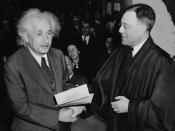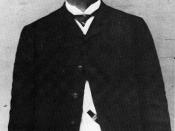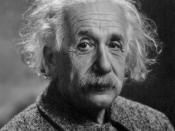Einstein has become a symbol of the modern science, a figure that has subverted all the patterns of the American definition of the hero. Einstein was the first intellectual superstar and he has gained his popularity through the only way the Americans would accept it - through an intuitive non-academical intelligence, by applying the discoveries of his brilliant mind on pragmatic things, as the rockets and the atomic bomb.
Einstein was enormously helped by the fact that he wasn't associated with any renowned educational university institution and that his statute wasn't depending on an official crediting - things towards which the Americans have a dual attitude: they insist upon them, and, on the other hand, they don't trust them. On the contrary, Einstein was the scientist that has won the congeniality of the crowds, of the common people, although he spoke the obscure language of mathematics.
Albert Einstein was born on March, 14th 1879 in Ulm, a modest town in Germany, in a Jewish family.
His father, Hermann Einstein, was an electrician and had inventor stray impulses. His mother, Pauline Koch, had a serious nature and musical inclinations, performing very well Beethoven's sonatas on the piano - Einstein will inherit from her side the passion for classical music. The brother of his mother, Caesar Koch, an engineer who lived with the family, has had a great influence upon the child, mostly in what exact sciences are concerned. Einstein's uncle revealed to him the fascinating side of mathematics: "It's an amusing science. When we run after an animal and we can't catch it, we name it for a moment x, and we continue to pursue it until we put it into the sack."
When little Albert was 5 years old, his father showed him a pocket compass - an object that...


